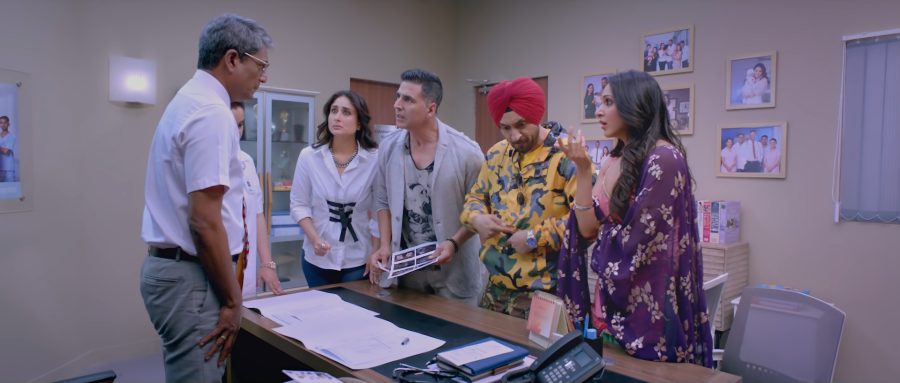Movies
There is an interesting premise, but the performances are better
‘Good Newwz’ is a new entry in a series of films in Bollywood that deals with the issue of sex in a mature way, but couldn’t stay away from stereotypes.
Abhimanyu Dixit
Sex and Bollywood is a tale as old as cinema and equally old is the struggle Bollywood has faced dealing or even talking about sex. In the early days, sex in Indian cinema was representative—two flowers emerged out of nowhere and began shaking and trembling, and we all understood that the actors kissed. Archaic censorship laws meant that the audiences were expected to use their imaginations, like if actors thrust their gyrating hips to lewd lyrics, we understood the metaphor.
Things didn’t change much in the 21st century. But now came audience-friendly sex scenes. Sweaty actors mock kissed each other’s necks, and moaned (always in songs) with their eyes shut. Slowly entered the sex comedies, but these were mostly without any thought or plot featuring perverts who talk in lewd double entendres, objectified women, and got in trouble, all because they want to get laid.
But slowly there seems to a slight shift in the way sex is dealt with in Bollywood. Issue-based sex comedies are being given serious thought and are well written. Sex is no longer the most scandalous thing but rather an everyday reality. Vicky Donor (2012), Shubh Mangal Saavdaan (2017), and Badhaai Ho (2018) proved that you can make a film with sex in the epicentre and still be mature about everything. There are sex jokes in these films, but none of them are indecent. The double entendres here are situational. The actors talk about sex, but somehow, and yet, more often than not, you can watch these films with your parents, and not cringe. The latest film, Good Newwz falls in this spectrum.
Varun Batra (Akshay Kumar) and Deepti Batra (Kareena Kapoor Khan) regard sex as a means to bear a child. They haven’t tried to conceive for the last seven years of their marriage. Now Deepti believes that time is running out. And, the mandatory pressure from friends and family to conceive doesn’t help her cause either. Varun, however, hasn’t really come to terms with being a father, but he agrees to everything Deepti asks him to do. The film begins with Deepti declaring that she is ovulating, and Varun races (literally in a cycle) to her.
Deepti and Varun are portrayed as sophisticated couples, who have done their internet research on positions during and after sex that help conceive. Most of the jokes in the first fifteen minutes are based on this situation. Sex isn’t ever shown in the film, instead it’s comically implied. Sex for this couple is a job. Even after trying their best, Deepti and Varun can’t conceive. So, they ask doctors Anand Joshi (Adil Hussain) and Sandhya Joshi (Tisca Chopra) for help. Their doctors suggest a very potent in vitro fertilisation (IVF), and Deepti and Varun agree.
In the same hospital, we meet another couple. Honey Batra (Diljit Dosanjh) and Monika Batra (Kiara Advani). They are emotional, very reactive, and struggle with the English language. They seem nothing like the sophisticated Batras, but they share the same problems. They too haven’t been able to conceive, and have also agreed to IVF, to be performed by the same doctors.
Things get messed up when doctors Anand and Sandhya apologise to the two Batra couples for a terrible mistake. They confess that the sperm samples from Honey and Varun were switched in the laboratory, because of their similar surnames. Now, Deepti is pregnant with Honey’s sperm, and Monika is pregnant with Varun’s. Now, abortion they’re told is a bad idea because of health conditions, and both couples have to live with the gross negligence. This is where the film breaks for interval.
There isn’t much to the story after that and the film relies on the strongly written characters—it’s four leads. And, the actors who play these characters are easily the high point of the film. The lead, Akshay Kumar is a delight to watch. His portrayal of Varun as a mean, selfish orthodox man, who lives in the ideologies of the 90s, but is learning the ways of the new millennium is a delight to watch. Kumar’s casting feels on point, also because he’s playing very close to his age. His wife Deepti, played by Kareena is also equally good. Deepti is the stark opposite of Varun. She is controlling and demanding, and although they might not sound like an ideal couple, these actors and their performances will make you believe that the two perfectly complement each other.
Honey and Monika are written as the Punjabi stereotypes. They are everything a Punjabi song is—loud, flashy, blunt, but jolly. This could have been a catastrophe in the hands of incapable actors because both Honey and Monica are written as very conventional characters. However, because of the fabulous performances of Advani and Dosanjh, the audiences see beyond the exterior Punjabi stereotypes.
The film is written by Jyoti Kapoor, Rishabh Sharma (dialogues), and Raj Mehta (director). The writing for the first half is brisk, and filled with sharp humour. But through the second half, the film starts feeling formulaic and stretchy. And that’s mostly because all the emotional and melodramatic moments are reserved for the second half. However, the humour aspect is maintained throughout and it saves the film.
The writing, however, isn’t without flaws. For example, the writers seem to be a little too invested in the idea of lineage. Two major characters in two different instances are saying things like, ‘The obsession to pass on your genes is a very deep one’ and, ‘Akhir apna khoon toh apna hi hota hai na?’ (In the end, own blood is what matters, no?). These are statements by the doctor and Deepti respectively. But strangely the film doesn’t carry these values and never even deals with the issue any more than the dialogues. The writers could have also definitely dealt better with the Punjabi stereotypes.
In hindsight, it’s as if the writers found one interesting idea and designed everything else around that one premise. However, in order to maintain their interesting premise, they stayed away from developing the story any further. Also, at times, the film focuses too much on culture and traditions, making it feel like this film isn’t aware of the contemporary India. In their bid to maintain the dramatic twists in the plot, the film portrays a clear anti-abortion stance. Both the doctors, and Varun and Deepti discuss abortion, but they quickly shut down as soon as the topic comes up. Deepti doesn’t want an abortion because, she says, “We can’t be murderers.” An accomplished celebrity, Kareena Kapoor Khan, calling abortion murder can’t be the message contemporary India needs.
All said and done, we must appreciate the film, first for its actors and second for bringing issues like this in the mainstream, and for treating the issue with respect. Commercial Indian cinema has always struggled dealing with sex. It has always been an eyebrow raising, scandalous issue and therefore it’s a welcome change that makers of today want to do more than jiggle flowers.
Good Newzz
Starring: Akshay Kumar, Kareena Kapoor Khan, Diljit Dosanjh, Kiara Advani
Writers: Jyoti Kapoor, Rishabh Sharma, Raj Mehta
Director: Raj Mehta
Stars: 2.5




 9.83°C Kathmandu
9.83°C Kathmandu












